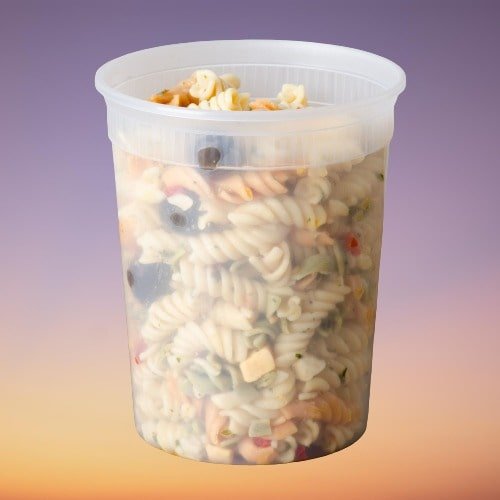A complete guide to handling and storing items with plastic bulk containers
The Function of Bulk Plastic Containers in Effective Recycling Practices and Sustainability
Mass plastic containers are indispensable to modern-day reusing efforts. Their design enhances the efficiency of material collection and transport, adding to sustainability goals. These containers not just enhance room however likewise help in monitoring contamination levels. Their application is not without difficulties. Comprehending the full extent of their influence discloses a complicated relationship between logistics and ecological obligation that necessitates more exploration.
Comprehending Bulk Plastic Containers
Bulk plastic containers act as a necessary component in various sectors, assisting in the storage and transportation of goods. These containers are generally made from robust products such as high-density polyethylene (HDPE) or polypropylene, which supply sturdiness and resistance to environmental factors. Their layout commonly includes functions like stackability and modularity, permitting reliable use space during both storage space and transit.
Industries such as agriculture, food handling, and producing regularly use mass plastic containers because of their lightweight nature and convenience of handling. The containers come in numerous dimensions and configurations, dealing with the certain demands of different products. Their flexibility prolongs past simple performance; they can also be personalized with lids, deals with, and labeling options to enhance use - bulk plastic containers for sale. Consequently, bulk plastic containers play a critical duty in optimizing logistics and supply chain operations across numerous sectors, thereby contributing to general performance and cost-effectiveness
Advantages of Utilizing Bulk Plastic Containers in Recycling
The application of mass plastic containers greatly boosts the performance of the procedure when organizations focus on reusing initiatives. These containers are developed to optimize room, enabling the storage and transportation of larger quantities of recyclable products. This causes fewer trips to reusing centers, therefore lowering gas consumption and associated exhausts.
Additionally, bulk plastic containers are long lasting and immune to different ecological elements, ensuring that products stay safeguarded during handling and transportation. Their light-weight style even more adds to reduce transport costs.
Moreover, the harmony of these containers facilitates better sorting and handling of recyclable materials, which can improve total recycling rates - Bulk Plastic Containers. Organizations that take on bulk plastic containers additionally demonstrate a dedication to sustainability, favorably influencing their brand name image. Inevitably, these benefits not only simplify recycling methods but likewise add to more comprehensive environmental goals
Just How Bulk Plastic Containers Facilitate Product Collection
Reliable material collection is greatly improved by the usage of mass plastic containers, as they offer a reliable and organized service for gathering recyclable things. These containers are created to fit large quantities of materials, which streamlines the sorting and storage space process. Their stackable layout makes best use of area utilization, making it much easier for facilities to arrange recyclables without clutter.
Additionally, bulk plastic containers are weather-resistant and resilient, enabling outside positioning without degradation. This strength guarantees that materials continue to be protected till they are collected for processing.

The uniformity in shapes and size of these containers helps with standardization throughout collection factors, making it possible for much better monitoring of recyclable volumes. Furthermore, their transparent nature enables very easy exposure of materials, aiding in the surveillance of contamination levels and guaranteeing that only proper products are collected. In general, bulk plastic containers play an important duty in streamlining the material collection procedure, therefore promoting efficient reusing techniques.
Transport Effectiveness and Environmental Impact
Transport performance plays a crucial function in the recycling procedure, specifically via the optimization of lots ability in bulk plastic containers. By making best use of the quantity of product transported, companies can significantly decrease the number of trips called for, thereby minimizing their carbon footprint. This method not only enhances operational efficiency however additionally adds to more sustainable ecological practices.

Maximizing Lots Ability
Enhancing load capacity is commonly forgotten, it plays an important function in improving transportation effectiveness and reducing ecological influence in recycling techniques. By optimizing the volume that mass plastic containers can hold, reusing procedures can reduce the variety of journeys needed for transport. This not just decreases gas intake however likewise reduces the deterioration on lorries. Reliable tons monitoring enables centers to use room efficiently, guaranteeing that each transportation cycle is as effective as possible. Furthermore, well-optimized loads can lead to far better arrangements with logistics service providers, potentially reducing total prices. Eventually, boosting lots capability contributes to a much more sustainable reusing system by fostering efficient source usage and reducing waste produced throughout transportation.
Decreasing Carbon Impact
As reusing procedures undertaking to reduce their environmental impact, reducing the carbon footprint connected with transportation becomes a crucial goal. Mass plastic containers play a critical function in accomplishing this goal by boosting lots effectiveness and maximizing logistics. Their lightweight yet sturdy style permits maximum freight space usage, reducing the number of trips called for to transport products. By consolidating deliveries, reusing centers can decrease gas usage and greenhouse gas exhausts. Additionally, purposefully finding recycling centers minimizes transportation ranges, furthermore reducing carbon outcomes. In addition, using fuel-efficient automobiles and alternate energy sources boosts total sustainability. By incorporating these practices, the recycling sector can considerably diminish its carbon impact, contributing to a more lasting future.
Difficulties in using Mass Plastic Containers

Contamination Problems
Contamination issues stand for a substantial obstacle in the effective usage of mass plastic containers within recycling methods. These containers frequently collect deposits from previous contents, resulting in combined products that can hinder the recycling process. Impurities such as food waste, chemicals, or non-recyclable products can compromise the stability of the entire set, causing increased disposal expenses and reduced reusing prices. In addition, incorrect cleaning or sorting can aggravate these issues, making it difficult for recycling centers to process materials successfully. The existence of impurities not only affects the high quality of visit our website recycled items yet also undermines the general sustainability initiatives focused on minimizing plastic waste. Attending to these contamination obstacles is crucial for enhancing the efficacy of bulk plastic container recycling.
Recycling Infrastructure Limitations
Inefficiency in reusing framework poses considerable obstacles for the effective administration of mass plastic containers. Many reusing facilities do not have the capacity to process big quantities of these containers successfully, resulting in enhanced hold-ups and expenses. Furthermore, insufficient sorting modern technologies commonly cause contamination, as mass containers might be blended with other materials, making complex the recycling process. Limited transportation alternatives also prevent the activity of bulk plastic containers to ideal recycling centers, leading to raised garbage dump waste. In addition, an absence of standard procedures for bulk container reusing creates complication among customers and companies, further complicating initiatives to advertise sustainability. Attending to these infrastructure restrictions is vital to boost recycling techniques and optimize the capacity of mass plastic containers in a round economy.
Ideal Practices for Executing Mass Plastic Containers
They should prioritize a calculated strategy that enhances efficiency and minimizes contamination threats when companies take into consideration carrying out bulk plastic containers in their reusing practices. Selecting the proper container dimension and kind is vital to fit the quantity of products being processed. Organizations must likewise develop clear labeling and signs to direct users on appropriate disposal approaches, decreasing confusion and mistakes. Normal training sessions for team can further reinforce these practices, guaranteeing everybody comprehends their functions in keeping reusing stability.
Furthermore, organizations should implement a routine upkeep timetable to examine and clean containers, preventing the buildup of impurities. Partnering with neighborhood recycling facilities can additionally simplify the collection procedure, making sure that materials are efficiently processed. Finally, organizations must keep an eye on and evaluate their recycling metrics, using this information to improve practices gradually and advertise continuous enhancement in their sustainability initiatives.
The Future of Bulk Plastic Containers in Sustainable Practices
As companies significantly focus on sustainability, the function of bulk plastic containers in reusing methods is readied to progress considerably. Advancements in materials scientific research are resulting in the development of naturally degradable and recyclable alternatives, improving the environmental advantages of bulk plastic containers. In enhancement, the application why not try here of closed-loop systems will enable less complicated collection and repurposing of these containers, lowering waste and source consumption.
Technological improvements, such as smart radar, will allow firms to keep track of the lifecycle of mass containers, boosting effectiveness in reusing procedures. As consumer need for sustainable practices expands, companies will likely take on bulk plastic containers made for reuse and long-lasting worth. Additionally, partnership between governments and sectors will certainly cultivate the establishment of standardized recycling methods, guaranteeing that mass containers are efficiently incorporated into wider sustainability campaigns. On the whole, the future of bulk plastic containers appears appealing, with considerable capacity for adding to a round economy.
Regularly Asked Inquiries
Just How Are Bulk Plastic Containers Made and What Materials Are Utilized?
Mass plastic containers are commonly made from high-density polyethylene (HDPE) or polypropylene (PP) These products are refined with injection molding or blow molding strategies, causing sturdy, lightweight containers suitable for various storage and transportation needs.
Can Bulk Plastic Containers Be Recycled Numerous Times Before Recycling?
Yes, bulk plastic containers can be recycled numerous times prior to reusing. Their durability and style enable repeated usage in different applications, advertising sustainability and resource effectiveness while reducing the need for new containers.

What Qualifications Exist for Mass Plastic Containers in Recycling?
Various qualifications for bulk plastic containers consist of Full Report the Recycling Collaboration's qualification, the Cradle to Cradle Licensed ™ standard, and the Sustainable Packaging Union's standards, guaranteeing containers fulfill certain environmental and recyclability requirements for reliable recycling.
Exactly How Do Mass Plastic Containers Compare to Various Other Recycling Storage Space Options?
Bulk plastic containers use better sturdiness and capacity contrasted to other recycling storage alternatives, decreasing the danger of contamination and facilitating effective transportation. Their style supports much better company, improving total effectiveness in recycling procedures.
What Is the Lifespan of a Bulk Plastic Container in Recycling Processes?
The life expectancy of a mass plastic container in reusing procedures generally ranges from 5 to ten years, relying on use, material quality, and environmental problems, permitting multiple cycles of use before ultimate disposal or recycling.
When companies focus on reusing efforts, the usage of mass plastic containers considerably boosts the efficiency of the procedure. Transportation efficiency plays a crucial role in the reusing process, particularly through the optimization of lots capacity in mass plastic containers. The usage of mass plastic containers in recycling practices faces considerable difficulties, especially worrying contamination problems and restrictions within recycling framework. Contamination issues stand for a substantial obstacle in the efficient use of mass plastic containers within reusing methods. When organizations take into consideration executing mass plastic containers in their reusing techniques, they need to focus on a strategic method that boosts efficiency and reduces contamination risks.